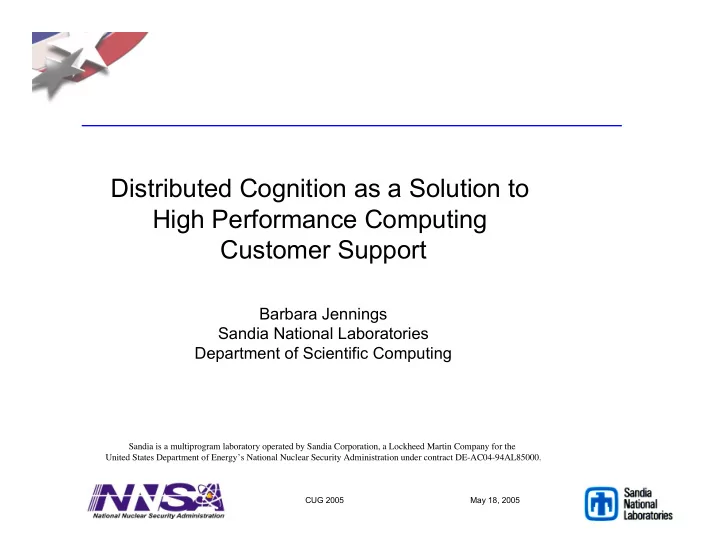

Distributed Cognition as a Solution to High Performance Computing Customer Support Barbara Jennings Sandia National Laboratories Department of Scientific Computing Sandia is a multiprogram laboratory operated by Sandia Corporation, a Lockheed Martin Company for the United States Department of Energy’s National Nuclear Security Administration under contract DE-AC04-94AL85000. Barbara Jennings Department 9328 CUG 2005 May 18, 2005
Topics of Consideration • Shared Knowledge and Distributed Cognition • Technical Cooperation • Motivation to Develop Community • Coordination of Information • The Model for Sandia National Laboratories • Recommendations for Future Developments Barbara Jennings Department 9328 CUG 2005 May 18, 2005
Shared Knowledge and Distributed Cognition A definition: • Human cognition is not solely possessed or residing in the mind of an individual • It is the result of people thinking in conjunction or partnership • Social, historical, physical, artifactual (Gaveriel Salomon, 2001) Barbara Jennings Department 9328 CUG 2005 May 18, 2005
Shared Knowledge and Distributed Cognition Enabling Shared Knowledge: • Social processes should be treated as cognitions (Resnick, 1981) • Tools are artifacts of distributed intelligence • The community members using tools define the activity (Pea, 2001) Barbara Jennings Department 9328 CUG 2005 May 18, 2005
Technical Cooperation • Online technology may be used to exploit economies of cooperation through online exchange of information: – Gifting – Nonrival – Nonexcludable • Challenges posed: – The need to motivate contributors – Coordinating the information (Kollock, 2004) Barbara Jennings Department 9328 CUG 2005 May 18, 2005
Motivation to Develop Community • Social Dynamics – People will access a site online for the information; they will return for the community • A site should provide: – Design for change – A way to exchange feedback – Give members the power to contribute to the information (Kim, 2000) Barbara Jennings Department 9328 CUG 2005 May 18, 2005
Coordination of Information • Knowledge Management – Security – Should not Distract the User – Quality Control • Knowledge Management Tools – Must be familiar to the user Barbara Jennings Department 9328 CUG 2005 May 18, 2005
CLIK: Collaborative Learning, Information, and Knowledge • Specific Needs of the HPC Environment – Dynamic Landscape – Customers are the Experts – Problem Solving Requires Research – Support must be interoperative – Access to timely information • Academic Framework – FOCAL (Gunawardena, et al, 2003) – Minimalist (J.M. Carroll, 1998) – Flow (M. Csikszentmihaly, 2000) Barbara Jennings Department 9328 CUG 2005 May 18, 2005
CLIK Model for HPC Technical Support USER KNOWLEDGE BASE HPC HPC On-Line email CONSULTANTS CONSULTANTS Documentation EXPERTS/ User MENTORS Collaboration Phone Area Other Sites Training Web Pages USER Barbara Jennings Department 9328 CUG 2005 May 18, 2005
CLIK: Collaborative Learning, Information, and Knowledge • SocioTechno Community – Goal to create a culture of shared information gathering and exchange – Construct Technical Knowledge through Social Collaboration • Design based on: – Collection – Dissemination – Management Barbara Jennings Department 9328 CUG 2005 May 18, 2005
CLIK • Motivation – Novice can find the information that they need to get started – Experts can collaborate – Anyone can contribute – Manages information Barbara Jennings Department 9328 CUG 2005 May 18, 2005
The Interface Analyst Analyst Information Information Calendar Calendar Collaboration Collaboration Area Area Code Code Optimization Optimization SARAPE SARAPE Training Training Barbara Jennings Department 9328 CUG 2005 May 18, 2005
Where do we go from here? • Build it and they will come. Let them add on and they will stay! • Encourage community building – More collaboration tools – Member identity - Wiki • Make changes as the system evolves and the needs change Barbara Jennings Department 9328 CUG 2005 May 18, 2005
? • Comments,questions, lunch Barbara Jennings Department 9328 CUG 2005 May 18, 2005
Recommend
More recommend